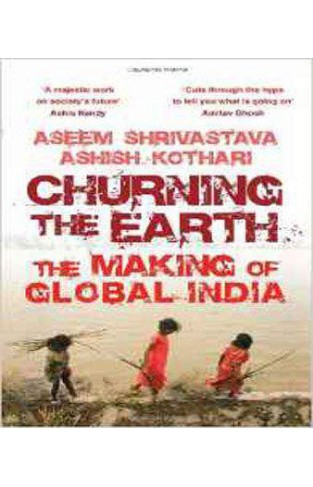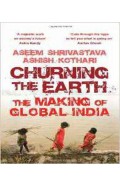Churning The Earth:: The Making of Global India
By: Aseem Shrivastava
-
Rs 897.00
- Rs 1,495.00
- 40%
You save Rs 598.00.
Due to constant currency fluctuation, prices are subject to change with or without notice.
The world stands so dazzled by India s meteoric economic rise that we hesitate to acknowledge its consequences to the people and the environment. In Churning the Earth, Aseem Shrivastava and Ashish Kothari engage in a timely enquiry of this impressive growth story. They present incontrovertible evidence on how the nature of this recent growth has been predatory and question its sustainability. Unfettered development has damaged the ecological basis that makes life possible for hundreds of millions resulting in conflicts over water, land and natural resources, and increasing the chasm between the rich and the poor, threatening the future of India as a civilization. Rich with data and stories, this eye-opening critique of India s development strategy argues for a radical ecological democracy based on the principles of environmental sustainability, social equity and livelihood security. Shrivastava and Kothari urge a fundamental shift towards such alternatives already emerging from a range of grassroots movements if we are to forestall the descent into socio-ecological chaos.
| Book | |
| What's in the Box? | 1 x Churning The Earth:: The Making of Global India |
The world stands so dazzled by India s meteoric economic rise that we hesitate to acknowledge its consequences to the people and the environment. In Churning the Earth, Aseem Shrivastava and Ashish Kothari engage in a timely enquiry of this impressive growth story. They present incontrovertible evidence on how the nature of this recent growth has been predatory and question its sustainability. Unfettered development has damaged the ecological basis that makes life possible for hundreds of millions resulting in conflicts over water, land and natural resources, and increasing the chasm between the rich and the poor, threatening the future of India as a civilization. Rich with data and stories, this eye-opening critique of India s development strategy argues for a radical ecological democracy based on the principles of environmental sustainability, social equity and livelihood security. Shrivastava and Kothari urge a fundamental shift towards such alternatives already emerging from a range of grassroots movements if we are to forestall the descent into socio-ecological chaos.
Churning The Earth:: The Making of Global India
By: Aseem Shrivastava
Rs 897.00 Rs 1,495.00 Ex Tax :Rs 897.00
Zubin Mehta: A Musical Journey (An Authorized Biography)
By: VOID - Bakhtiar K. Dadabhoy
Rs 630.00 Rs 1,050.00 Ex Tax :Rs 630.00
Argo: How the CIA and Hollywood Pulled Off the Most Audacious Rescue in History
By: Antonio Mendez
Rs 2,817.00 Rs 4,695.00 Ex Tax :Rs 2,817.00
Civilian Warriors The Inside Story of Blackwater and the Unsung Heroes of the War on Terror
By: Erik Prince
Rs 1,436.00 Rs 1,795.00 Ex Tax :Rs 1,436.00
The Origins of Political Order From Prehuman Times to the French RevolutioN
By: Francis Fukuyama
Rs 3,505.50 Rs 3,895.00 Ex Tax :Rs 3,505.50
Manning Up: How the Rise of Women Has Turned Men into Boys
By: Kay Hymowitz
Rs 796.00 Rs 995.00 Ex Tax :Rs 796.00
The Obama Syndrome: Surrender At Home War Abroad
By: Tariq Ali
Rs 1,165.50 Rs 1,295.00 Ex Tax :Rs 1,165.50
The Quest For Meaning: Developing A Philosophy Of Pluralism
By: Tariq Ramadan
Rs 1,255.50 Rs 1,395.00 Ex Tax :Rs 1,255.50
The Pakistan US Conundrum Jihadists The Military And The People The Struggle For Control
By: Yunas Samad
Rs 1,255.50 Rs 1,395.00 Ex Tax :Rs 1,255.50
An Enemy We Created: The Myth Of The Taliban Al Qaeda Merger In Afghanistan 19702010
By: Alex Strick van Linschoten
Rs 4,200.00 Rs 5,250.00 Ex Tax :Rs 4,200.00
WikiLeaks: Inside Julian Assanges War on Secrecy
By: David Leigh & Luke Harding
Rs 680.00 Rs 850.00 Ex Tax :Rs 680.00
Argo: How the CIA and Hollywood Pulled Off the Most Audacious Rescue in History
By: Antonio Mendez
Rs 2,817.00 Rs 4,695.00 Ex Tax :Rs 2,817.00
Civilian Warriors The Inside Story of Blackwater and the Unsung Heroes of the War on Terror
By: Erik Prince
Rs 1,436.00 Rs 1,795.00 Ex Tax :Rs 1,436.00
No recently viewed books available at the moment.
Zubin Mehta: A Musical Journey (An Authorized Biography)
By: VOID - Bakhtiar K. Dadabhoy
Rs 630.00 Rs 1,050.00 Ex Tax :Rs 630.00
Churning The Earth:: The Making of Global India
By: Aseem Shrivastava
Rs 897.00 Rs 1,495.00 Ex Tax :Rs 897.00
Argo: How the CIA and Hollywood Pulled Off the Most Audacious Rescue in History
By: Antonio Mendez
Rs 2,817.00 Rs 4,695.00 Ex Tax :Rs 2,817.00
Civilian Warriors The Inside Story of Blackwater and the Unsung Heroes of the War on Terror
By: Erik Prince
Rs 1,436.00 Rs 1,795.00 Ex Tax :Rs 1,436.00















-120x187.jpg?q6)









-120x187.jpg?q6)



-120x187.jpg?q6)



